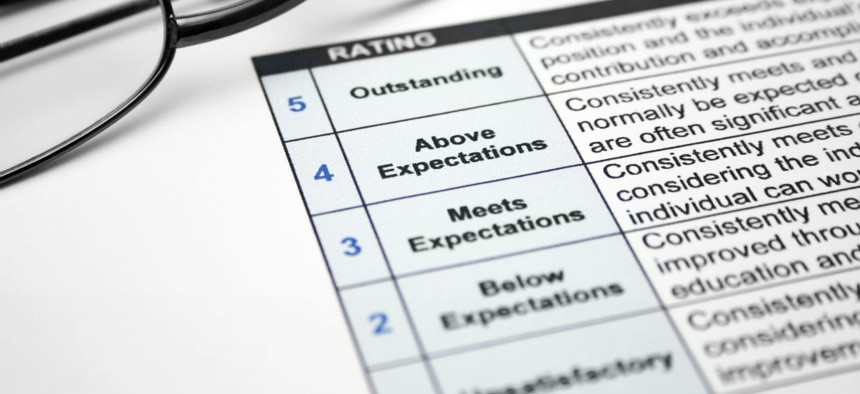
alexskopje/Shutterstock.com
Should Government Do Away With Annual Performance Reviews?
Real feedback happens more than once a year.
According to a recent article in the Harvard Business Review, “Reinventing Performance Management,” Deloitte is redesigning its performance management system on the notion that it “is increasingly out of step with [the company’s] objectives.” Specifically, Deloitte feels it drives neither employee engagement nor high performance. This has generated a lot of discussion.
Deloitte’s new system will not contain annual employee reviews, nor will it have any goals that cascade down to the employee level. The feeling is that “once-a-year goals are too ‘batched’ for a real-time world, and conversations about year-end ratings are generally less valuable than conversations conducted in the moment about actual performance.”
Deloitte’s new system has three basic goals:
- Recognize performance through variable compensation.
- See performance clearly through a team leader’s actions with respect to each employee (e.g., would the supervisor award an employee the highest possible pay increase/bonus, would the supervisor always want the individual on his team.)
- Fuel performance through weekly check-ins with employees.
The key component of the new system is the conversations, with the idea being that multiple ongoing conversations are likely to provide richer feedback, and are more likely to drive increased performance than annual reviews.
It is fair to say that the federal government’s performance management system could also use some improvements. According to the U.S. Office of Personnel Management’s 2014 Employee Viewpoint Survey: Only 68.2 percent of government employees feel that their performance appraisal is a fair reflection of their performance, and only 31.5 percent feel that in their work unit differences in performance are recognized in a meaningful way.
But it is highly unlikely the federal government will abolish annual reviews or cascading standards in the near term for a number of reasons. First, annual appraisals are required by law (5 U.S.C. Chapter 430.) Second, government doesn’t have a system of variable compensation. Lastly, OPM recommends cascading standards, and in my experience, most agencies try to take this approach. Annual reviews and cascading standards still make sense for the federal government. Annual employee appraisals are a critical component in linking employee performance to organizational results, and cascading standards help create a clear line of sight.
But government can still learn some important lessons from Deloitte’s efforts. For example, employees liked certain parts of the old system (e.g., the predictability of the process and their belief that it was fair). As the FEVS has shown year after year, many federal employees are less than satisfied with the way the current system is applied to them.
Government managers can take certain steps to address this concern. They can:
- Give employees periodic report cards that let them know how they are doing relative to organizational standards and their peers.
- Post the performance of people who occupy multi-encumbered positions (employee privacy can be maintained by assigning a symbol to everyone whose performance is posted).
The idea behind both techniques is to consistently let people know how they are doing and provide them with a sense of context. Therefore, when decisions are made that directly impact employees, it comes as no real surprise. A performance appraisal system where there are reliable consequences for every level of performance will foster the perception that the system is fair and transparent.
Another key lesson from Deloitte’s new review system is the importance of frequent—in this case weekly—feedback. Far too often in government, employees receive feedback only once or twice a year—and in some cases, that feedback may be no more than giving an employee a form to sign indicating that their performance is acceptable. As a result, government employees don’t always know how they are doing and are often surprised and irritated (or even angered) by their review and the size of their award if any.
Holding weekly, or at a minimum monthly, discussions with individual employees, that are used as an opportunity to drive performance, clarify areas of confusion and review individual development, would go a long way toward improving performance system management.
Stewart Liff is a fellow with The Performance Institute, specializing in human resources management, visual performance management and team development. He is the author of multiple books, including Managing Government Employees and A Team of Leaders.
(Image via alexskopje/Shutterstock.com)






